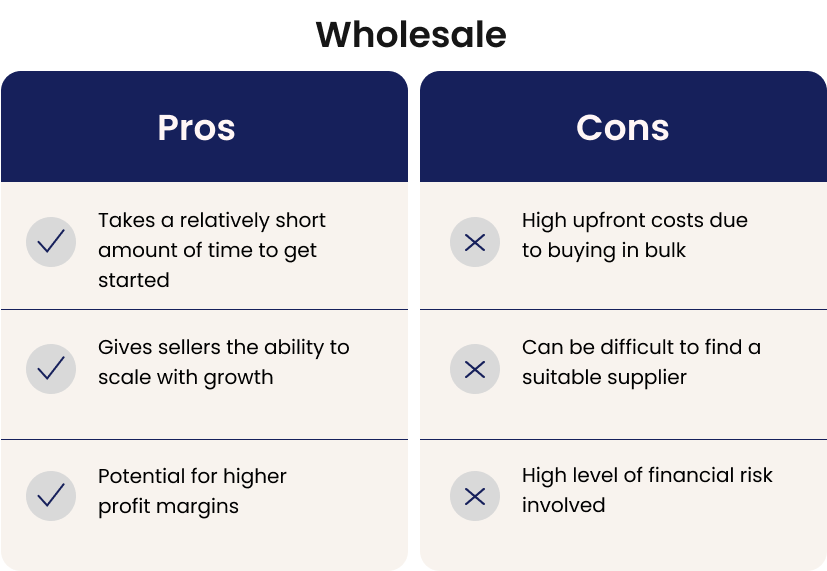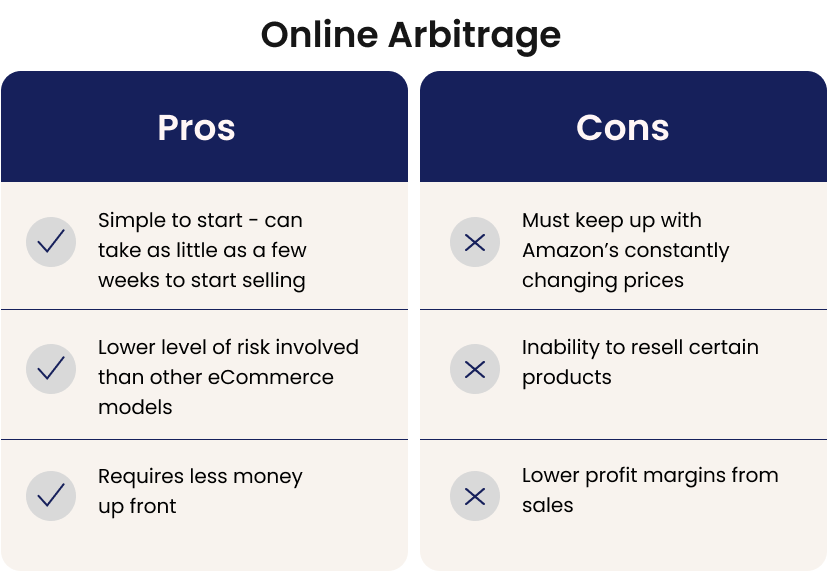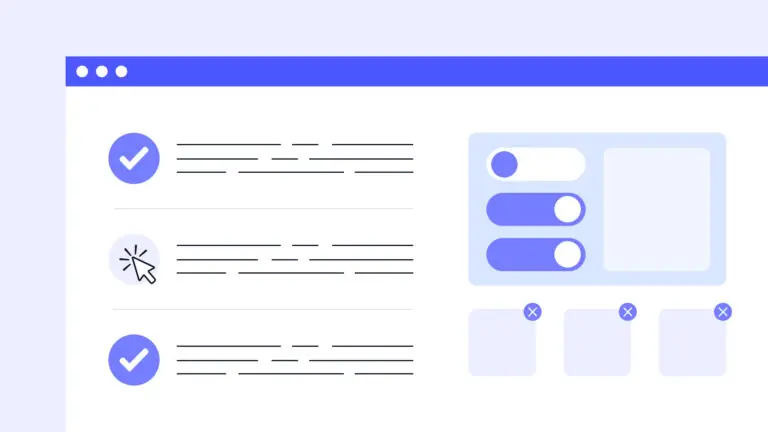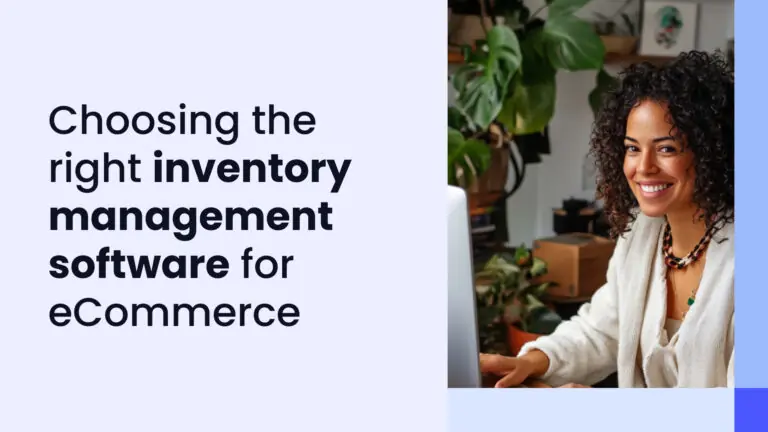There are many business models and selling methods available to eCommerce sellers to help them succeed. In order to select the model that best suits your budget, time constraints, and lifestyle, you’ll want to understand your options. Online arbitrage and wholesale are two popular business models.
Online arbitrage refers to purchasing goods online for a low price and reselling them for a higher price on Amazon. Wholesale is the purchasing of products in bulk from the supplier or manufacturer and then reselling them on Amazon for a profit.
While these two business models may sound similar, there are some important distinctions. The most significant difference between online arbitrage and wholesale is the quantity of products you purchase to resell and the amount of money you spend up front. Read on to learn more about online arbitrage and wholesale on Amazon.
In this article we’ll cover:
- What is wholesale?
- What is online arbitrage?
- What is the difference between online arbitrage and wholesale?
- Wholesale
- Online arbitrage
- Wholesale pros and cons
- Online arbitrage pros and cons
What Is Wholesale?
Wholesale sellers buy products in bulk from a supplier or manufacturer. Since they buy in bulk, the items usually have a lower cost per unit. Buying directly from the source, also allows them to avoid going through a middleman, lowering the price.
Therefore, wholesale sellers are able to purchase these bulk products at a particularly low price. They can then sell them online for a profit, without having to worry about manufacture or production.
What Is Online Arbitrage
In the online arbitrage business model, sellers seek out low priced products from other online stores, discount aggregators, or other low-cost sources. They then purchase the items for a low cost, and resell them on Amazon or another eCommerce platform at a higher price. The difference is their profit.
What Is the Difference Between Online Arbitrage and Wholesale?
Subscribe to the eCommerce newsletter for
top industry insights
While on the surface online arbitrage and wholesale may seem very similar, there are actually important differences between these two business models.
One of the most significant distinctions between these models is the size of their operations and the amount of money needed upfront. Another key difference between online arbitrage and wholesale is how sellers find the products they sell at a profit.
Wholesale sellers talk to manufacturers and distributors directly. They don’t want to go through a reseller or online aggregator, preferring to buy products straight from the source. Online arbitrage sellers, on the other hand, don’t care where they buy their products from. They’re simply looking online anywhere to find low cost items that they can resell.
Wholesale
Size of operation
Wholesalers base their business model on getting the lowest possible rates on products from manufacturers and suppliers. They do this by buying products in bulk. Suppliers typically offer significant discounts on large quantities of product, so wholesalers purchase a lot at a time in order to secure these low prices. Therefore, wholesalers tend to have larger scale operations in order to buy and sell such large amounts of products.
Most suppliers and manufacturers have minimum order quantities (MOQ) that a buyer must reach in order to go through with the sale. This can range from $2,000 to $30,000, and can even be higher than that depending on the product and supplier. This is a hefty cost up front, so wholesalers must have plenty of cash on hand in order to pay for the products and keep their business afloat.
Suppliers
As one of the most critical parts of the wholesale operation, finding a suitable supplier for your business is essential. You must reach an agreement that benefits both parties directly with these manufacturers and suppliers. The wholesaler may need to convince these businesses to partner with them. The supplier will also need to offer the wholesaler an attractive deal. If the prices aren’t low enough, the operation won’t succeed. Therefore, there is often some negotiation involved.
Generally, wholesalers want to create relationships with the people and businesses they buy their products from. This relationship ensures they get the best possible deal and service, and helps them avoid delays and disruptions due to misunderstandings.
Working with a local supplier can help make building and maintaining a relationship easier, since there will be fewer challenges with communication and cultural differences. It’s also easier to visit them in person to inspect your products, and time zone differences don’t make it difficult to connect.
If you are working with a manufacturer overseas, however, you likely won’t get the chance to see your products in person before making your purchase. You’ll need to find a way to verify that your supplier is making high quality products according to your order. It’s therefore important to hire a product inspector or find another way to carry out an inspection so your high up-front payment doesn’t go to waste.
Products
When choosing a product to buy, wholesalers should be more cautious than arbitrage sellers. Since you’re buying in bulk, your financial loss will be far more significant if you’re not careful. If you aren’t able to sell your product in the end, you’ll be stuck with lots of inventory and a heavy financial loss.
To be successful as a wholesaler, it’s important to choose a product that will sell well at a price that will net you a profit. Conduct your product research thoroughly before committing to an item. Make sure your products have relatively low competition compared to online arbitrage as well as a cheaper price point.
Online Arbitrage
Size of operation
Online arbitrage operates differently on a business scale since it doesn’t require as much money up front. You may start by investing as little as $500 and end up making a respectable profit. However, your earnings will generally be lower than wholesale just because you’re selling fewer goods than the other model.
This business model also doesn’t have the limitation of an MOQ, so online arbitrage sellers can buy as many, or as few, products as they want to. Unlike with wholesale, online arbitrage sellers can operate based solely on the funds they have available, their sales plan, and their product profit margin.
Supplier
An arbitrage seller acquires their products by searching online stores and aggregators and seeing what they have available. Depending on their available funds, they will order as many products as they feel they can sell on Amazon for a profit.
Unlike with wholesale, online arbitrage sellers don’t need to build relationships with brands or suppliers. Instead, they try to find low cost items from any relevant seller that can be sold at a profit. They may buy products from the same seller multiple times, or they may always choose to purchase from different sellers.
Products
Product research is a must for both wholesalers and online arbitrage. Any item is fair game for either business model, too. There isn’t too much difference in terms of which products wholesalers and online arbitrage sellers can choose to resell. However, since online arbitrage sellers tend to sell smaller amounts of product, they risk lower financial loss if a product fails to sell as well as they had hoped.
Advantages and Disadvantages of Wholesale and Online Arbitrage
As with any business model, there are quite a few pros and cons of wholesale and online arbitrage. When choosing which one is right for your business, it’s a good idea to get a clear understanding of the benefits and risks involved with each.

Pros of selling wholesale
1. Relatively short start-up time
One of the significant benefits of the wholesale model is the time it takes to start your enterprise. It tends to take about six months to set up a wholesale business. You’ll spend most of this time finding and negotiating with suppliers to give you a good price on the products you want.
2. Ability to scale with growth
Popular content
- 14 strategies to improve your eCommerce business’s financial health
- 50+ ChatGPT prompts to elevate your eCommerce business
- A guide to pricing your product on Amazon
- 5 marketing metrics all eCommerce businesses should track
- All about Amazon PPC
ECommerce requires a lot of planning ahead. If you sell a product that becomes immensely popular and sales take off, you’ll need to figure out a way to keep up with demand. If you can continue to fill orders and sell at a faster rate, it opens the door to growth. Failure to do so, on the other hand, can lead to stockouts, which can harm your business.
Some wholesale eCommerce sellers will find themselves in this position and not be ready to expand. If you are a wholesaler, it’s easier to scale when you see this kind of demand increase, because you can simply increase your product order size or frequency from your suppliers.
3. Lower advertising costs
Wholesalers tend to sell products that are already popular. Therefore, demand will already be high for your product. As long as your prices are competitive, you won’t need to spend a lot of money on marketing to convince consumers to buy your item.
4. Possibility of high profit margins
Wholesalers are able to purchase products at a low price thanks to the fact that they buy in bulk, directly from the manufacturer or supplier. They can then set a price low enough to attract customers while still maintaining a high profit. This ensures a high ROI, or return on investment.
Cons of selling wholesale
1. High upfront costs
It can be challenging to spend a large amount of cash up front before bringing in any revenue from sales. You’re also never sure if your product will sell as well as you hope. Since a large part of wholesale selling is making large, bulk purchases, there is bound to be high costs up front that must be met. ECommerce funding can help, but it can still be a risky business model.
2. Can be difficult to find a suitable supplier
The eCommerce industry is incredibly competitive mainly because of how accessible it is. Because of that, finding a supplier that works for your business goals can be tricky. You’ll need to put in some time and effort to find a reliable supplier that is willing to work with your brand at the prices, quantities, and timelines you need to reach your goals.
3. High financial risk involved
Since wholesalers sellers purchase and sell such large batches of products, failing to sell your desired amount comes with a high level of financial loss. All of that money you paid up front for your bulk order is at risk, and it will drastically hurt your business if you can’t sell or if you need to lower your prices.
4. Requires accurate calculations of costs and projected revenue
As with any eCommerce business, it’s vital to carefully calculate all costs associated with selling your product. Accurate sales projections are also a must, so you can be sure you’ll be able to make a profit. Failure to fully account for your costs or understand your profit margins will lead to a big loss for your wholesale business. Since you’re buying products in bulk, miscalculating the amount of money spent can cause your business to lose out on a lot of cash.

Pros of online arbitrage
1. Simple and fast start-up process
Both online arbitrage and wholesale offer the opportunity to start a business quickly. However, online arbitrage is even faster than wholesale since you can begin to sell a product in a few weeks. It’s as simple as creating an account on Amazon and then finding a low-cost product that can be sold for enough money to make a profit. Then, you just need to buy said product and start selling it in your own online store.
2. Lower risk involved
Possibly the most significant benefit of choosing an online arbitrage business model over wholesale is that it’s not as risky. Since you don’t buy as many products at once, you put up less cash up front and therefore have less to lose if something goes wrong.
3. Variety of products to sell
If you’re an online arbitrage seller, you have a wide variety of options in terms of which product you can sell as well as where you can purchase it for a low price. Any online store or aggregator is fair game, and you’re not limited to a manufacturer or supplier as wholesalers are. You have the opportunity to diversify your product offering too, appealing to a wider consumer base than if you just sell one product that you buy in bulk.
4. Requires less money to begin
An online arbitrage seller doesn’t need much money to start out. There are no minimum order amounts involved and you can purchase as many or as few products as you can afford. The ability to turn profits without spending thousands and thousands of dollars is a huge benefit. Many sellers start their businesses on Amazon for just $500.
5. A great way to start in the industry
It can be tough to get started in the eCommerce industry. One mistake can result in a significant loss for your company. Online arbitrage is an excellent way to ease into eCommerce. Since it requires a lower investment than other business models and comes with less risk, it’s one of the most friendly options for newer sellers. You can start a business and learn the inner workings of running an online store.
Online arbitrage cons
1. Must keep up with Amazon’s constant price changes
There are a lot of sellers on Amazon, and the competition and prices are always changing. Most businesses want to find out their long-term profit margins, which requires an understanding of your prices and sales at least a few months into the future. However, due to the constant price fluctuations on Amazon as a result of changes in demand and competition, this can be difficult to estimate.
2. Inability to resell certain products
Certain categories and brands are restricted on Amazon. In order for an online arbitrage seller to resell products in these categories, you need to get approval from Amazon. As an online arbiter, you can’t just sell any product you choose. You’ll need to do some research to find out precisely what you can list within Amazon’s limits.
3. Products you find may be different from those on Amazon
One of the tricky parts about reselling is finding the exact items listed on Amazon. While searching online for products that can be resold, the pictures of that particular product can look the same but be different. While this is less common in the United States, if you’re purchasing your products from China, you may run into this problem.
4. Lower profit margins
While there are many benefits of online arbitrage, they come with the downside of lower profit margins, particularly when taking Amazon’s fees into consideration. Online arbitrage sellers will often be unable to generate as much revenue as private label vendors. If you’re an online arbiter, you should be aware of the costs involved in running your business successfully, because you likely won’t make as much money selling your products.
Subscribe to the eCommerce newsletter for
top industry insights
to our blog
Read the latest
from 8fig

Customization is everywhere – your playlists, your shopping cart, your subscriptions. So why settle for rigid funding? With 8fig, you’re in control. See why flexible financing is the future of eCommerce.

Products don’t sell – stories do. Learn how top brands use storytelling to create emotional connections, build trust, and drive sales. Ready to craft a narrative that converts? Let’s dive in.

Choosing the right inventory management software is key to avoiding stockouts and maximizing profits. Explore top features and expert tips to make demand-based restocking effortless.
